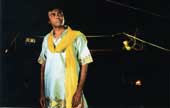 |
| Santanu Bandyopadhyay in Total Theatre’s Vyasa |
The emergence of the Intimate Theatre in the last couple of years seems to have somewhat revived the flagging interest of the average theatre-going audience. Suddenly, coffee shops, bookstores and art galleries are inviting young actors to take on what the proscenium may find too daunting to deal with. The youngsters are looking for alternatives in the citadels of a dying culture ?lending libraries, crumbling North Calcutta mansions, etc.
Ekushe Sonsod’s maiden theatre production seems to have opened a viable third front in this growing trend. Seasoned actors always look for author-backed roles and they are always eager to accept offers that promise that elusive creative space. Gappo Khonjar Galpa, which recently premiered at Gorky Sadan, presents them with an alternative ? a four-wall intimate setting where they can feel the pulse of the audience. It skilfully stitches three playlets penned by Debashis Sengupta into a holistic quest for meaning within the changing dynamics of the urban drawing room. The role of the mass media vis-?-vis commoners and celebrities was dissected with a probing eye. It could have been satiric or slapstick. Instead, the difference between real stories and blown-up accounts that the media tends to propagate has been laid bare. The last playlet offers an empathetic look into the insecurities and inconsistencies of an emancipated woman. All this comes laced with fine acting by Dwijen Bandyopadhyay and Sima Mukhopadhyay, among others. Although this endeavour is breaking no new ground, it’s definitely here to stay.
It takes courage to dramatise a cult literary text that Dilip Kumar found too tempting to film, but too sensitive to handle. Nandikar tried to execute it on stage only to leave it half-done. Shahzad Firdaus’s novel, Vyasa, a quasi-philosophical treatise on the early days of Aryan imperialism, just refused to give in. All that left Total Theatre facing a challenge that looked quite formidable given the constraints it wades through. Those who are familiar with director Santanu Bandyopadhyay’s earlier experiments with Shakespearean tragedy and Kabir Suman journals have reasons to feel sceptical. Experiencing his interpretation within the liberating confines of Sarala Memorial Hall, one returned home converted.
Bandyopadhyay is not stretching the limits of Intimate Theatre, but he is expanding its domain. It just required a chanting of a hymn from the Ishopanishad to get transported to the epic age where the action unfolded. As young Vyasa, sage Parashar’s son, wandered into the village of the untouchables, the racial politics of ancient India bared its fangs. Fresh debates ensued over knowledge and acquisition of skills that furthers it and over the meaning of life itself. Bhishma and Charvak joined the discourse till it reached the climax with Vyasa fighting it out with Shukdev, his son.
Bandyopadhyay made optimum use of the performance arena to suit his purpose. The main action was being played out on the floor with the audience seated in parallel rows. The proscenium stage, the stairs leading to the balcony, the pillars supporting it ? all came in handy while underlining the sense of vastness that the subject called for. The audience was sensitised in a subtle manner.
Sujoy Das










